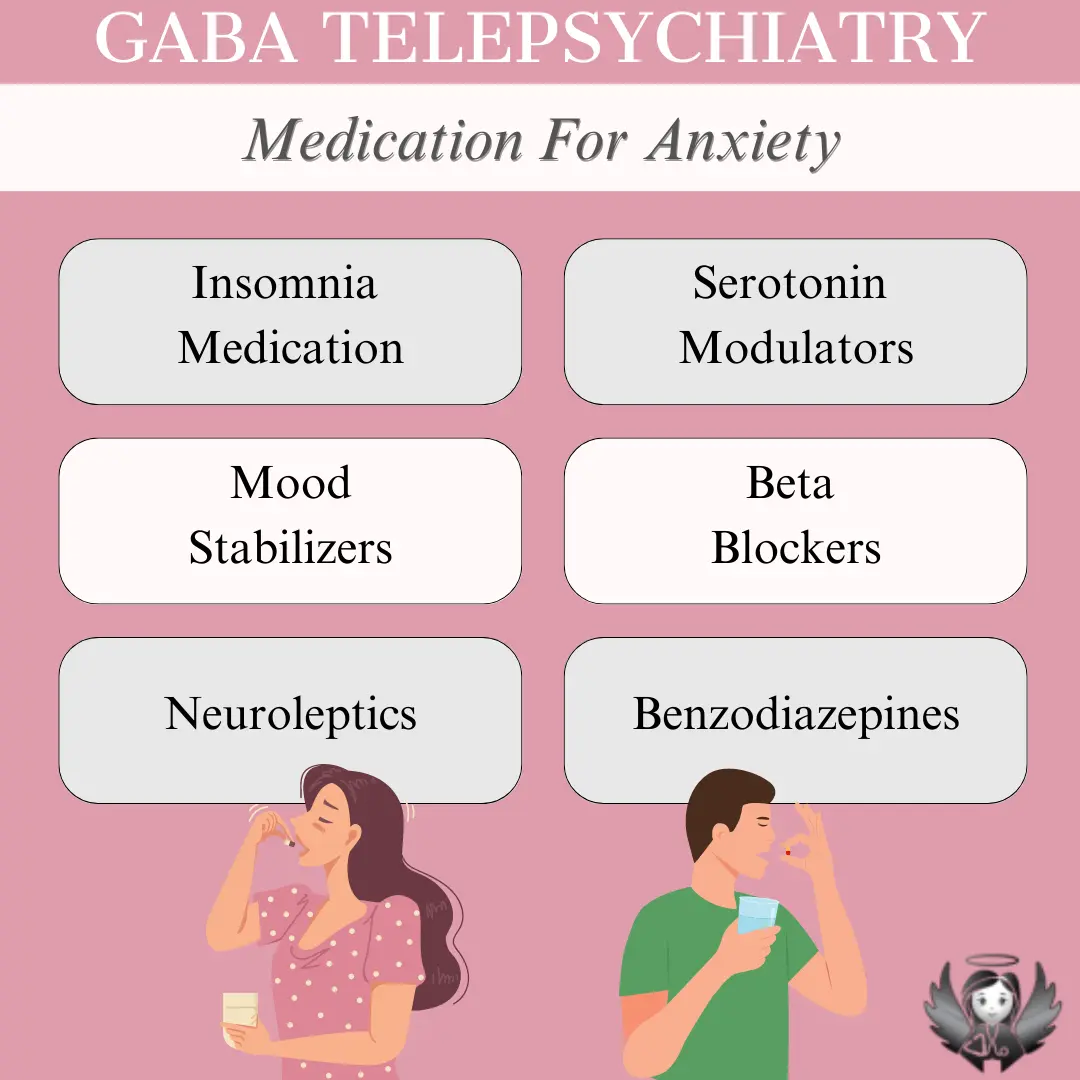Anxiety Treatment
Board-certified psychiatrist specializing in anxiety depression offers immediate help, including anxiety medication and treatment. Contact +1(833)312-4222 for assistance.


‘I know I have anxiety when I can’t start the day because I feel anxious about being anxious.’
Although a small amount of anxiety is necessary in order to achieve, or be accountable for anything, too much anxiety can ruin your health, career, academic performance, relationships and ultimately your life!
Effective management and treatment for anxiety is necessary for long term health and quality of life. Here at Gaba Telepsychiatry, we offer a wide range of anxiety treatments including therapy, nutrition, hormone evaluation, and medication. Our psychiatrists are committed to helping you find the right treatment and supporting you through the recovery process.
What is Anxiety?
What are the Different Types of Anxiety?
Anxiety can be categorized into anticipatory, retrospective and current:
Retrospective anxiety
Retrospective anxiety gets you worried about things that have happened in the past, even if the amount of worry is out of proportion to the severity of the event, or the stressor has resolved. This is common in obsessive compulsive disorder as well as post-traumatic stress disorder.
Current or situational anxiety
When you are suffering from current anxiety, you worry about things which are happening in the present. For example: a bus platform being too crowded, seeing a spider and worrying about being bitten or worrying about saying something wrong or doing the wrong thing while in a conversation.
Anticipatory anxiety
Anticipatory anxiety makes you worry about things which may happen in the future. For example, you may experience anxiety about going on a date, or giving a speech. The amount of worry can be out of proportion to the threat. Anticipatory anxiety may be about things which are unlikely to happen. For example, floods, fire, burglary, or a young person worrying that they may have cancer. Anticipatory anxiety is common in OCD, social phobia, generalized anxiety, and hypochondriasis.
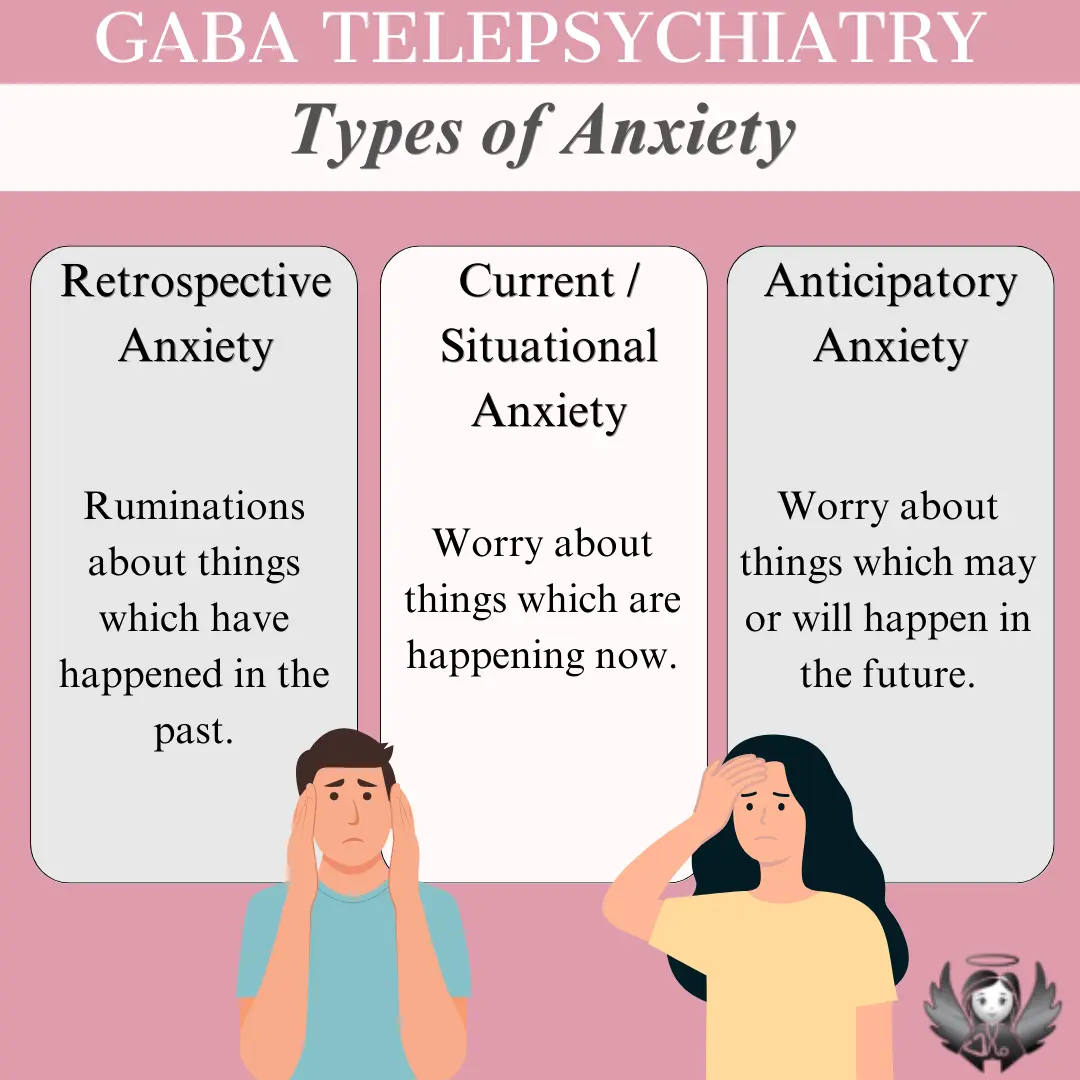
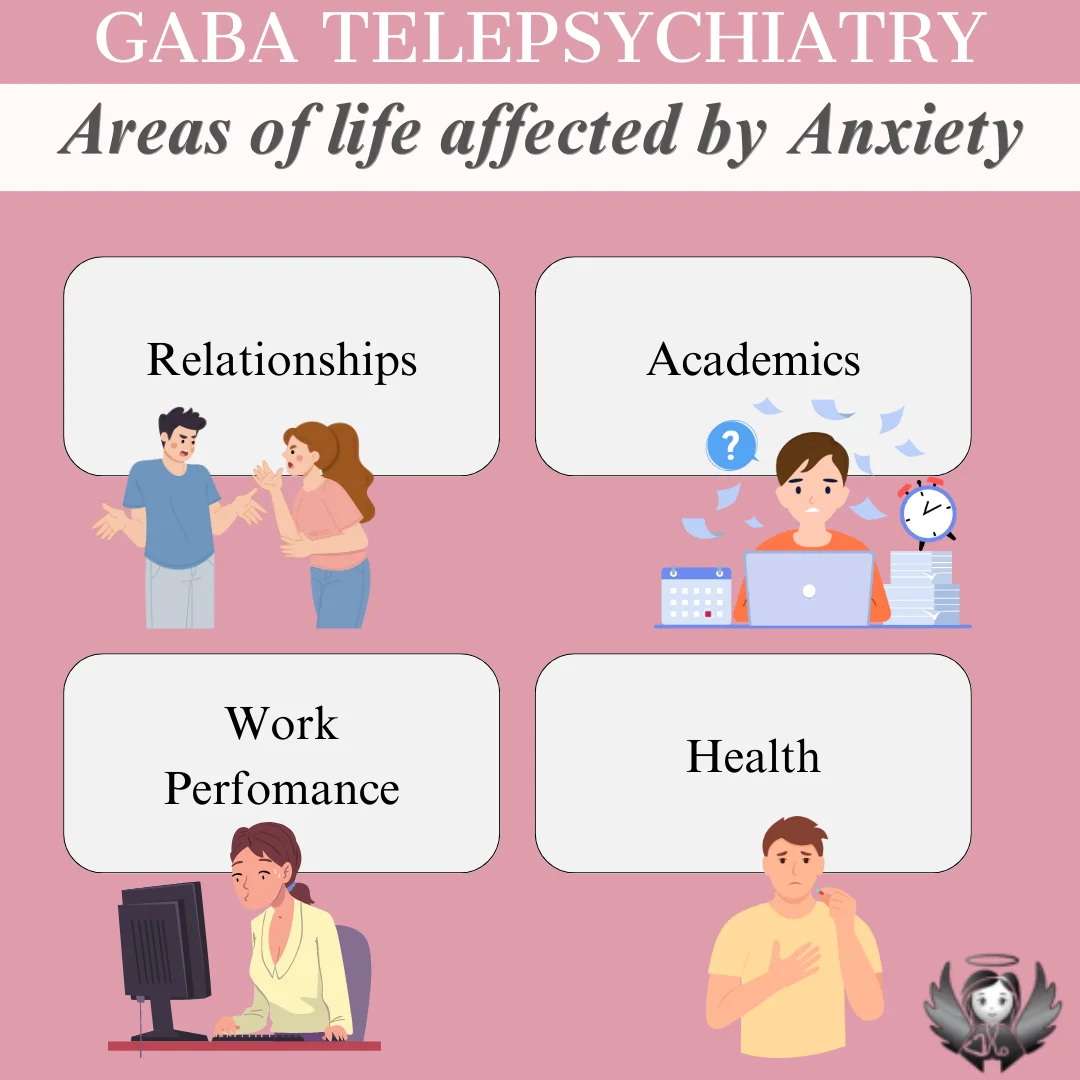
Anxiety Disorders
Anxiety disorders are a product of several factors including developmental, environmental, genetic, and psychological. Common Anxiety disorders include:
Agoraphobia:
Agoraphobia is about fearing places and situations where it’s hard to get away from, such as airplanes, public transport, or while standing in a queue amidst a crowd. Individuals with agoraphobia frequently do not leave the house. They avoid job interviews, movie theaters, planes, and vacations. With severe agoraphobia, individuals cannot even go to the grocery store, drive, or visit beloved family members.
Generalized anxiety disorder (GAD):
People with generalized anxiety disorder or GAD continuously worry about nothing. They experience unrealistic tension for no apparent reason.
Obsessive-compulsive disorder (OCD):
Obsessive compulsive disorder, better known as OCD, is when irrational intrusive thoughts enter your brain over and over again, causing distress. Sometimes intrusive thoughts are accompanied by compulsions. These include excessive handwashing, checking the lights or stove repeatedly.
Panic disorder:
Panic disorder (with or without agoraphobia) is the sudden and intense fear, experiencing chest pain, and heart pounding palpitations, feeling a loss of control, feeling something bad will happen. During a panic attack, you may feel like you are having a heart attack.
Social anxiety disorder:
Social anxiety disorder is the overwhelming stress around every day social situations. It involves intrusive thoughts or fear that you have said and done the wrong thing, you feel that you are boring, or that people are only ‘pretending.’ to like you. Avoidance of social situations, job interviews and dating are typical of social anxiety disorder.
Somatoform disorder:
In somatic symptom disorder, the anxiety symptoms present with various physical symptoms such as headache, abdominal pain, and loose bowel movements, thus disrupting their quality of life. Individuals with somatoform disorder are often unaware of their emotions, and repressed thoughts that present as bodily symptoms.
Specific phobias:
These may include fear of any particular object or situation, such as fear of heights, cats, and spiders. The sufferer usually realizes their fears are irrational, but cannot control panic symptoms associated with exposure. Individuals with severe phobias sometimes avoid leaving the house due to fear of exposure.
Anxiety disorders are almost always treatable, and symptoms can improve significantly with appropriate treatment.
Anxiety Psychiatrist
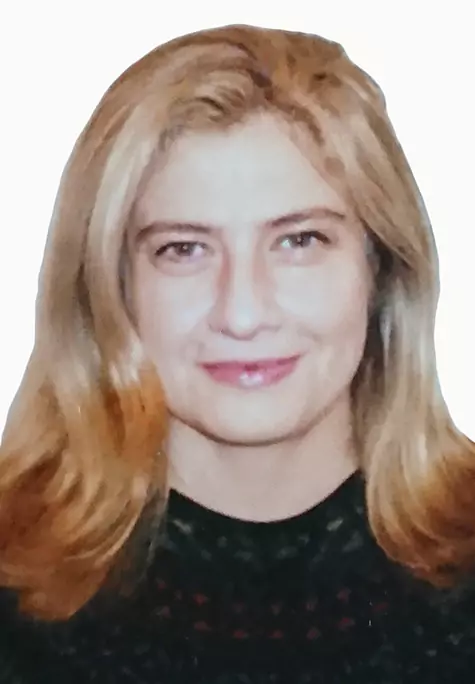
Dr. Valeria Serban
Board Certified Psychiatrist with Multiple State Licenses MBBS (MD)
Dr. Valeria Serban has twenty years of experience in treating anxiety disorders. She is a board-certified clinical neuropsychiatrist with licenses to practice in eighteen states.
Dr. Valeria Serban is an experienced and Board Certified neuropsychiatrist. She is compassionate and well-known for her warm personality and genuine commitment to patient care. She provides a warm and supportive environment for treatment and forms secure alliances with individuals and families to provide the maximum support for a complete recovery, or management of their symptoms.
Dr. Serban is greatly respected for her knowledge and her extensive work in neuropsychiatric conditions such as anxiety, depression, Parkinson’s disease, cerebral palsy, postpartum depression, bipolar disorder, schizophrenia, migraine, epilepsy, concussion, stroke, and dementia to name a few.
She explores different treatment options and works collaboratively with her patients to find one that best suits them. With more than twenty years of experience, she is knowledgeable and confident, treating all patients with utmost urgency and care.
Dr. Valeria Serban has a background in neuroscience and has completed her Ph.D. in Neuroscience. This background is a foundation for her interest in treating anxiety, postpartum depression, OCD, dementia, and a wide range of psychiatric illnesses.
To elevate patients’ quality of life, she offers customized treatment plans based on hormonal, nutritional, and medical health evaluations. Dr. Serban believes proper support, good therapy, and medications can greatly improve many psychiatric symptoms.
Medical School
Neurology Residency Training
Master of Philosophy (M.Ph.) - Neuroscience
Internal Medicine Residency
Neurology Residency
Doctor of Philosophy (Ph.D.) - Neuroscience
Clinical Neurophysiology Fellowship
Board Certification
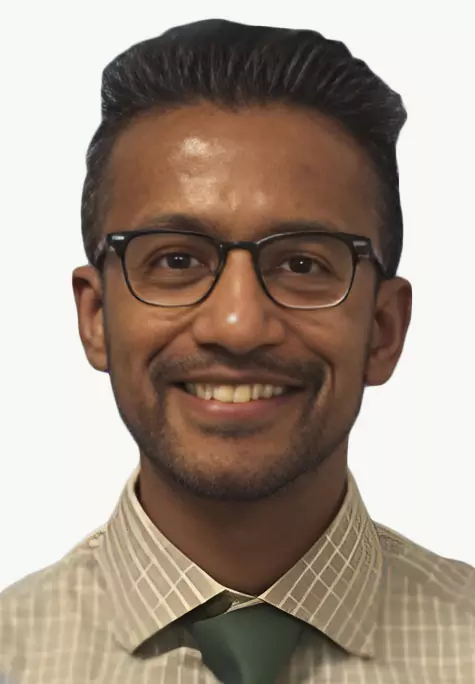
Dr. Tony Issac
Board Certified Psychiatrist in New York & New Jersey (MD)
Dr Tony Isaac is a double Board-certified Psychiatrist with nine years of experience practicing psychiatry. He provides compassionate discreet psychiatric evaluations, and psychiatric care services including medication management, and psychotherapy. He specializes in addiction recovery treatments and medication management.
Dr Isaac treats a wide range of psychiatric conditions, such as depression, insomnia, panic attacks, anxiety, OCD, bipolar disorder, and schizophrenia. He conducts suicide assessments, and acute stabilization and will work with your family and employer to provide support.
Dr. Issac also provides follow-up appointments, and psychiatric services including psychotherapy and sensitive medication titration. Dr. Issac can work with you to achieve a collaborative treatment plan and work towards recovery and healing.
Dr Issac is available for same-day appointments during emergencies and is available for weekend appointments to ensure that you receive the care and support you deserve.
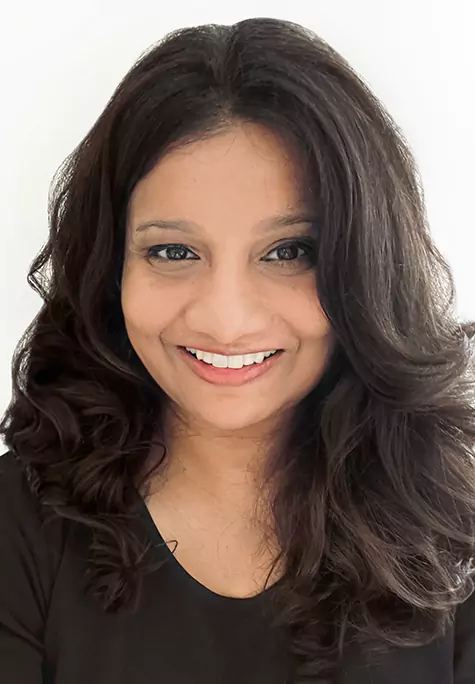
Dr. Gundu Reddy
Board Certified Psychiatrist with Multiple State Licenses MBBS (MD)
Dr. Gundu Reddy is a board-certified urgent psychiatrist with fifteen years of experience practicing clinical psychiatry and ten years of experience practicing forensic psychiatry, including as an anxiety disorder psychiatrist. She has trained in Medication Management, psychodynamic psychotherapy, and cognitive behavioral therapy, and has a special interest in integrative psychiatry. Dr. Reddy specializes in resolving problems caused by anxiety disorders, anxiety during pregnancy, generalized anxiety, social anxiety, obsessive compulsive disorder (OCD), and panic disorder.
Dr. Reddy believes that multiple factors should be considered when evaluating and treating a patient, including genetic and developmental factors, medical illness, nutrition, and hormones, as well as environmental and dynamic factors.
Many individuals receive substandard care due to incomplete evaluation, and an integrative approach, including the expertise of an anxiety disorder psychiatrist, is needed to provide optimum clinical improvement.
Dr. Reddy emphasizes that the decision to take psychiatric medication, including medication for anxiety disorder, should not be taken lightly and should be prescribed with the utmost care. The goal of medication management, including anxiety disorder medication management, is to achieve maximum efficacy with minimum side effects, and gentle titration.
Dr. Reddy believes that in most cases psychiatric illness is treatable, and most people can achieve significant improvement in symptoms, as well as social and occupational functioning, with high-quality and consistent care, including the expertise of an anxiety disorder psychiatrist. Her goal is to provide the best possible treatment to patients in a telepsychiatry or online psychiatry setting, utilizing her expertise as an anxiety disorder psychiatrist, and achieve the same standards of care as if seeing the patient in person.
Please schedule online or call +1(833)312-4222 if you wish to schedule an appointment with Dr. Reddy.
Schedule an Appointment with one of our Online Psychiatrists.
Clinical Services: California, Florida, Illinois, New Jersey, New York, South Carolina, Tennessee

Forensic Psychiatry Services: All of the US and Canada
How much does it cost to see an online psychiatrist at Gaba Telepsychiatry?
Your first online appointment with one of our psychiatrists will cost $400. The follow-up appointments will be $250. If you have out-of-network benefits, we can submit claims on your behalf.
Anxiety Symptoms
Anxiety symptoms can be physical, cognitive (negative thoughts or ruminations), and somatic (loss or impairment of functions of part of the body).
Physical Symptoms of Anxiety
- Stomach ache or diarrhea
- Extreme fatigue
- Giddiness, restlessness, and nausea
- Heart palpitations with fast breathing
- Increased blood pressure and sugar level
- Low sex drive
- Less or excess urination
- Profuse sweating and trembling
- Severe headaches, and body pain
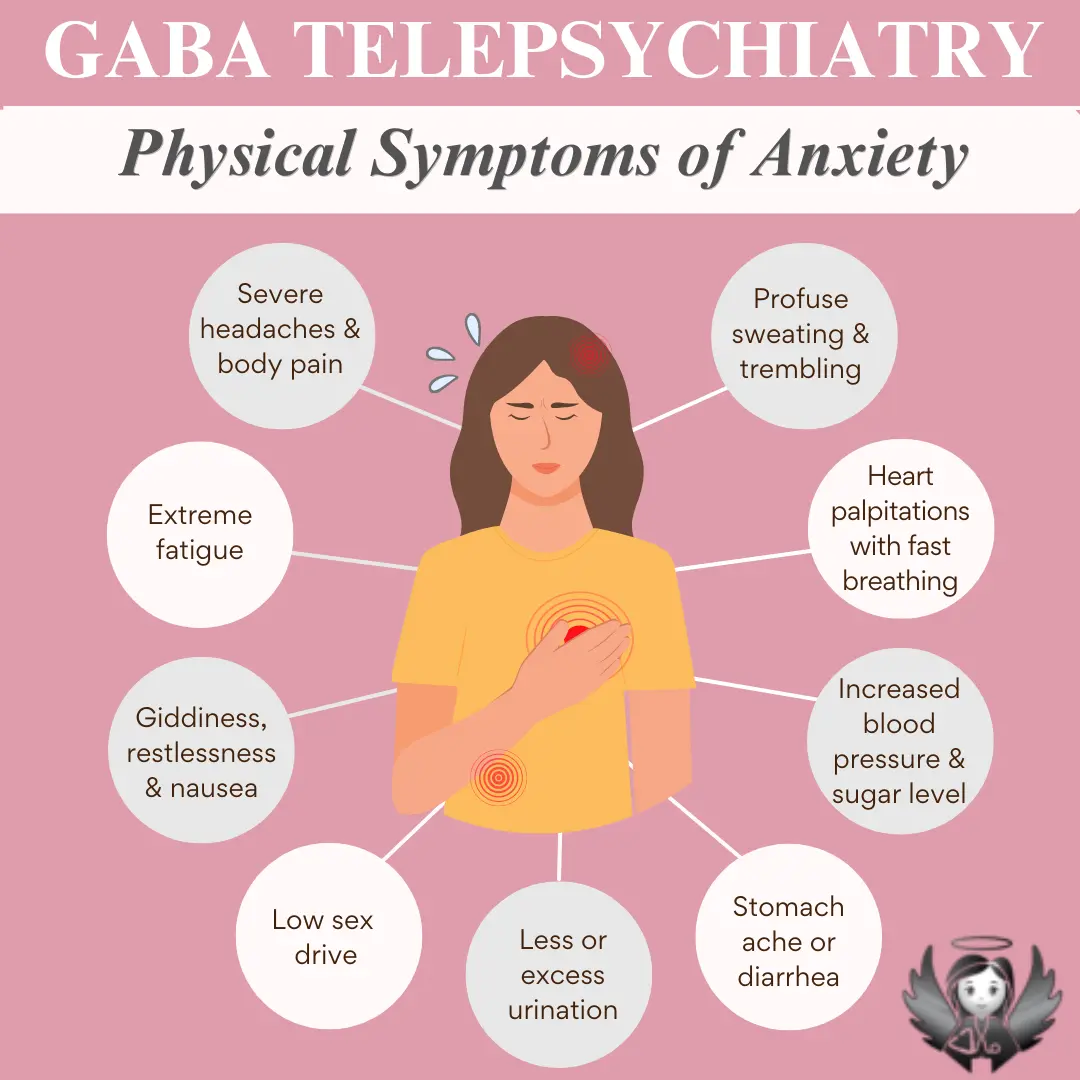
Cognitive Symptoms of Anxiety
- Confusion
- Memory problems
- Problems with attention and concentration
- Decreased problem solving
- Negative intrusive thoughts
- Worry that something bad will happen
- Rumination about past events
- Distorted reality or paranoia
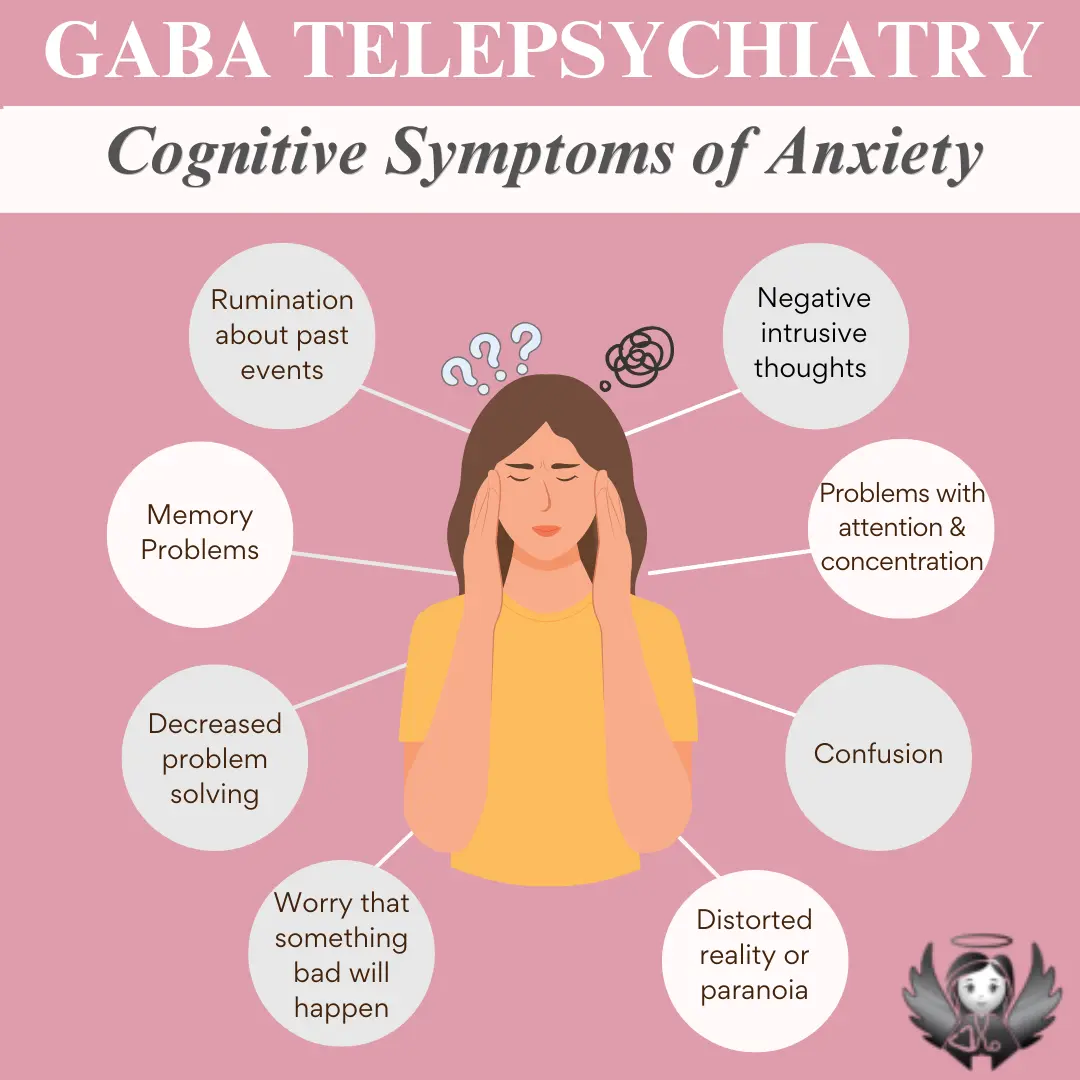
Dissociative Symptoms of Anxiety
- Feeling of detachment from body
- Feeling of detachment from places or events
- Loss of sight
- Loss of ability to use part a limb or body part
- Memory loss
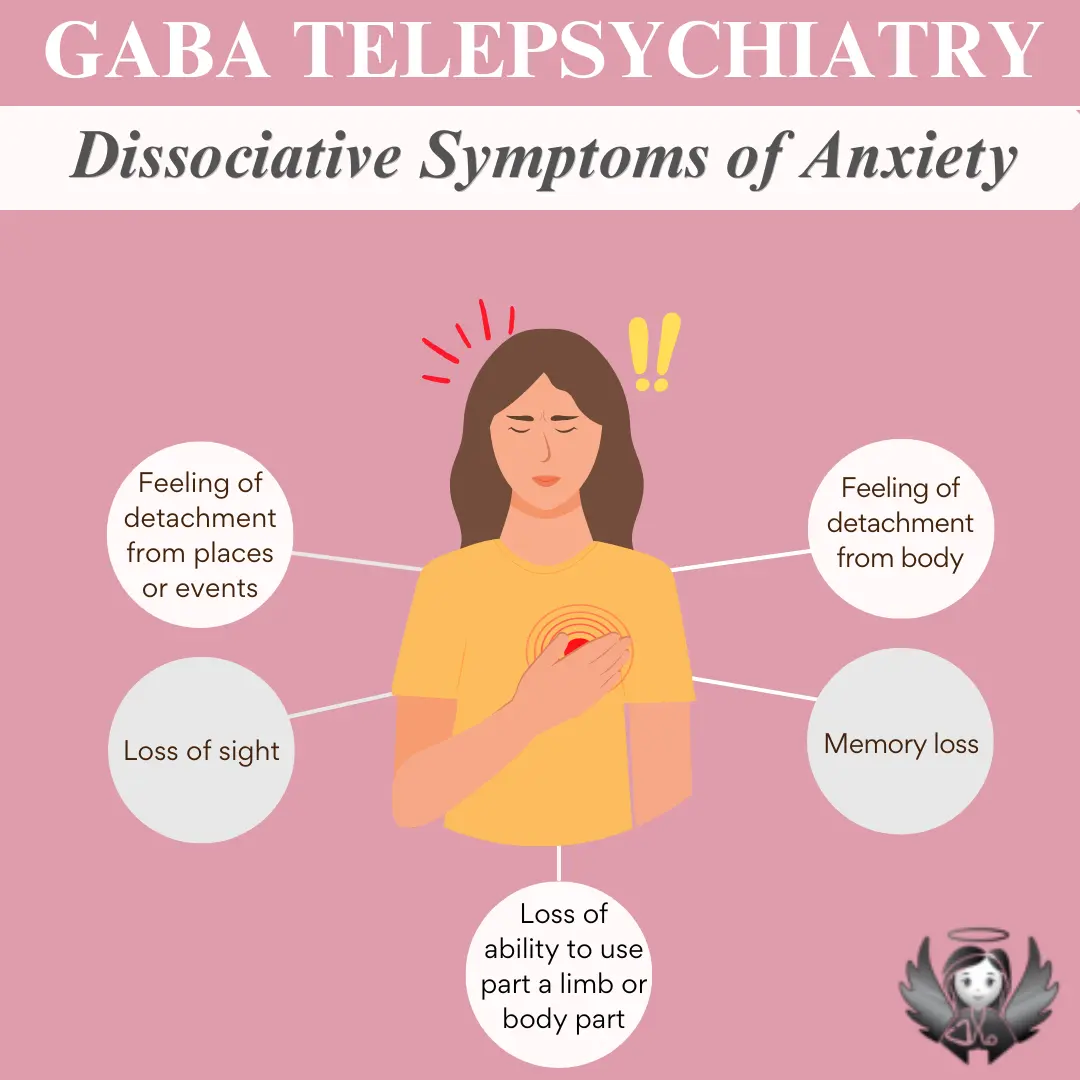
Anxiety Related Behaviors
- Anxiety eating or binge eating
- Excessive Drinking
- Use of recreational drugs
- Shouting, fighting
- Sabotaging career and relationships
Causes of Anxiety
Anxiety is usually caused by an imbalance of chemical messengers or neurotransmitters in the brain, our brain’s response to experiences, trauma, and environmental stressors.
There is usually more than one cause of anxiety. Most people seeking anxiety treatment state that they have always lived with some anxiety, but one or multiple stressors have recently exacerbated their anxiety symptoms, to the point that they can no longer manage them. In order to avoid or treat anxiety effectively, it is important to try to identify and treat the underlying causes:
- Congenital or idiopathic (no known cause)
- Genetic (family history)
- Developmental
- Trauma: history of physical, sexual or emotional abuse, assault
- Chronic / Acute Medical illness (eg. Anemia)
- Prolonged poverty, basic needs such as food and shelter not being met
- psychodynamic: relationship patterns, communication styles, and interaction with other
- Academic stress (eg. undiagnosed ADHD)
- Hormone imbalance, pregnancy, postpartum, menopause, polycystic ovaries, thyroid disease
- Sleep disturbance: insomnia, narcolepsy, sleep apnoea
- Situational anxiety - economic instability, moving, sick child or parent
- Workplace stress
- Nutritional deficiencies (eg. Magnesium, b12)
- Heavy Metal Poisoning
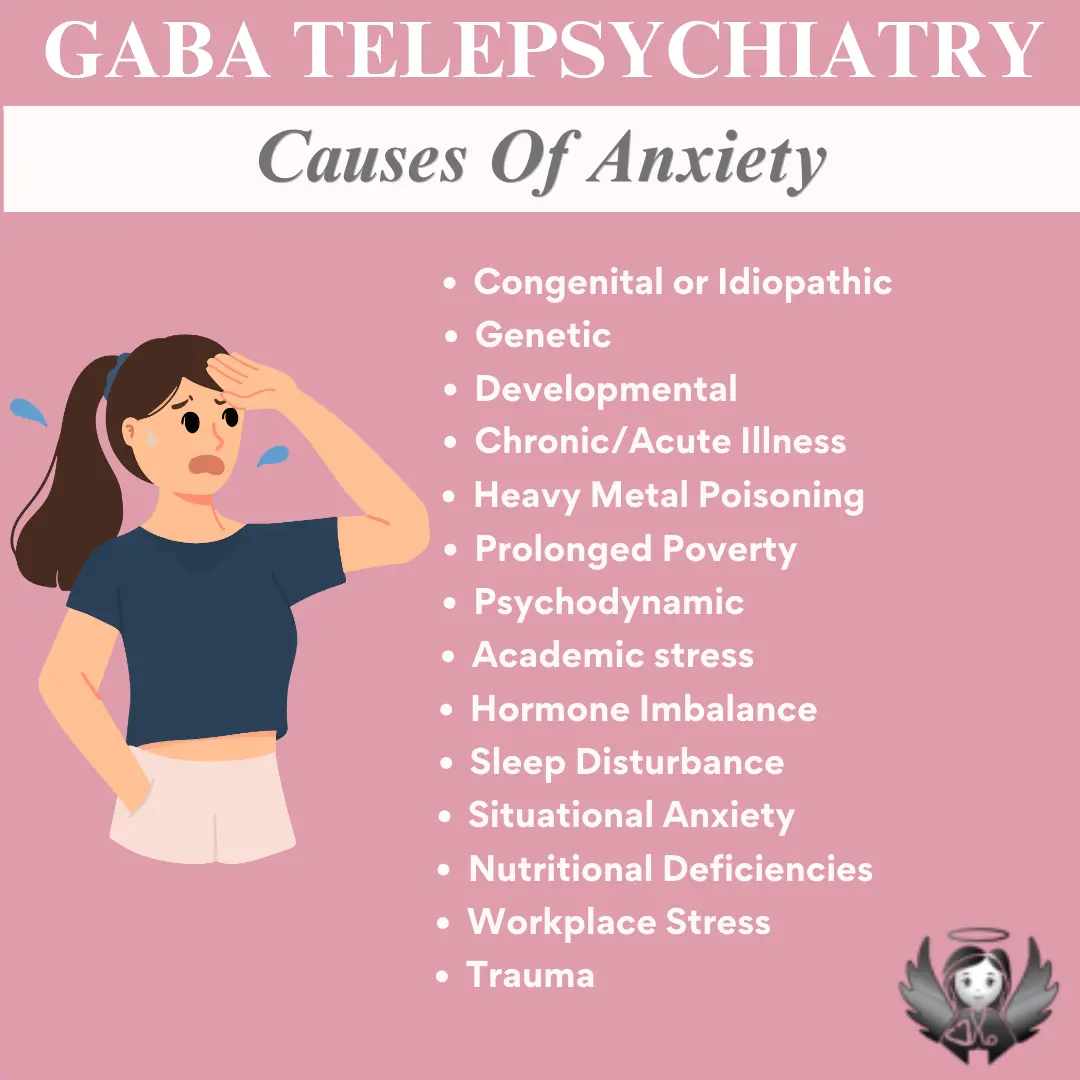
Anxiety Treatment


Treatments for anxiety include treating exacerbating causes, therapy and medication.
- Treat exacerbating medical conditions such as anemia, asthma, and sleep apnoea.
- Treat exacerbating nutritional deficiency. Common deficiencies include iron deficiency, B12 deficiency, and magnesium deficiency.
- Treat hormone imbalance such as thyroid imbalance, and PCOS. Close monitoring of hormone levels for transgender patients is also advised.
- Psychotherapy for treatment of anxiety include: Cognitive behavioral therapy, psychodynamic psychotherapy, supportive therapy, group psychotherapy, family and relationship therapy.
- Treat insomnia.
- Treat other psychiatric illnesses such as depression, ADHD, and bipolar disorder which may be exacerbating anxiety.
- Medication should be prescribed with care to address symptoms and minimize side effects. Ideally, non-addictive medications should be used for longer term benefits.
- Address external stressors such as financial management, work life balance, relationship and family issues.
- Exercise for good mental health.
- Alternative anxiety treatments include yoga, meditation, acupuncture, hypnosis, and deep tissue relaxation. Alternative treatments can be useful, but it is important to seek help from a reputable practitioner.
- Supplements for treatment of anxiety such as ashwagandha, inositol, gaba, and theanine can provide some temporary relief, but should be taken with medical supervision to avoid toxicity.
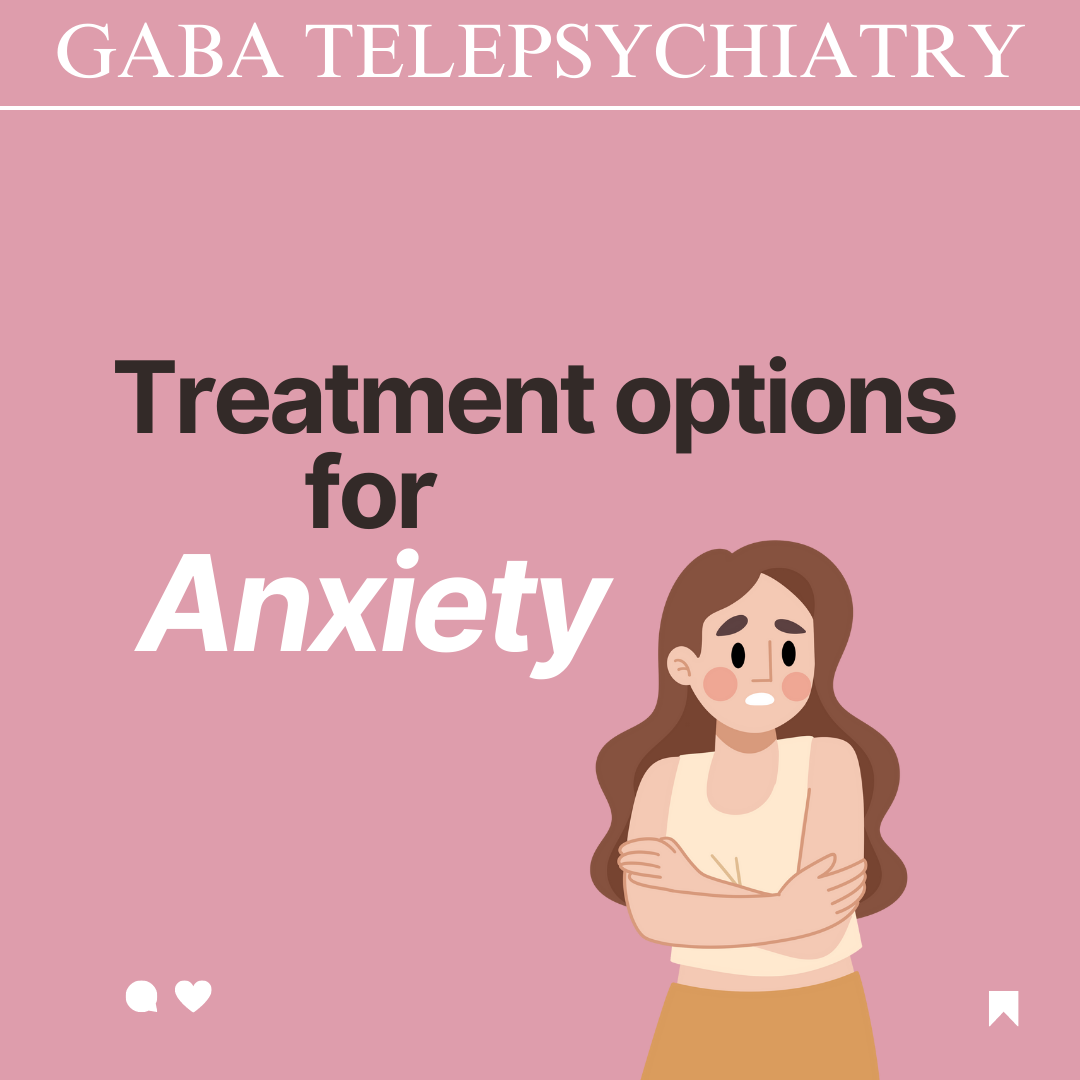
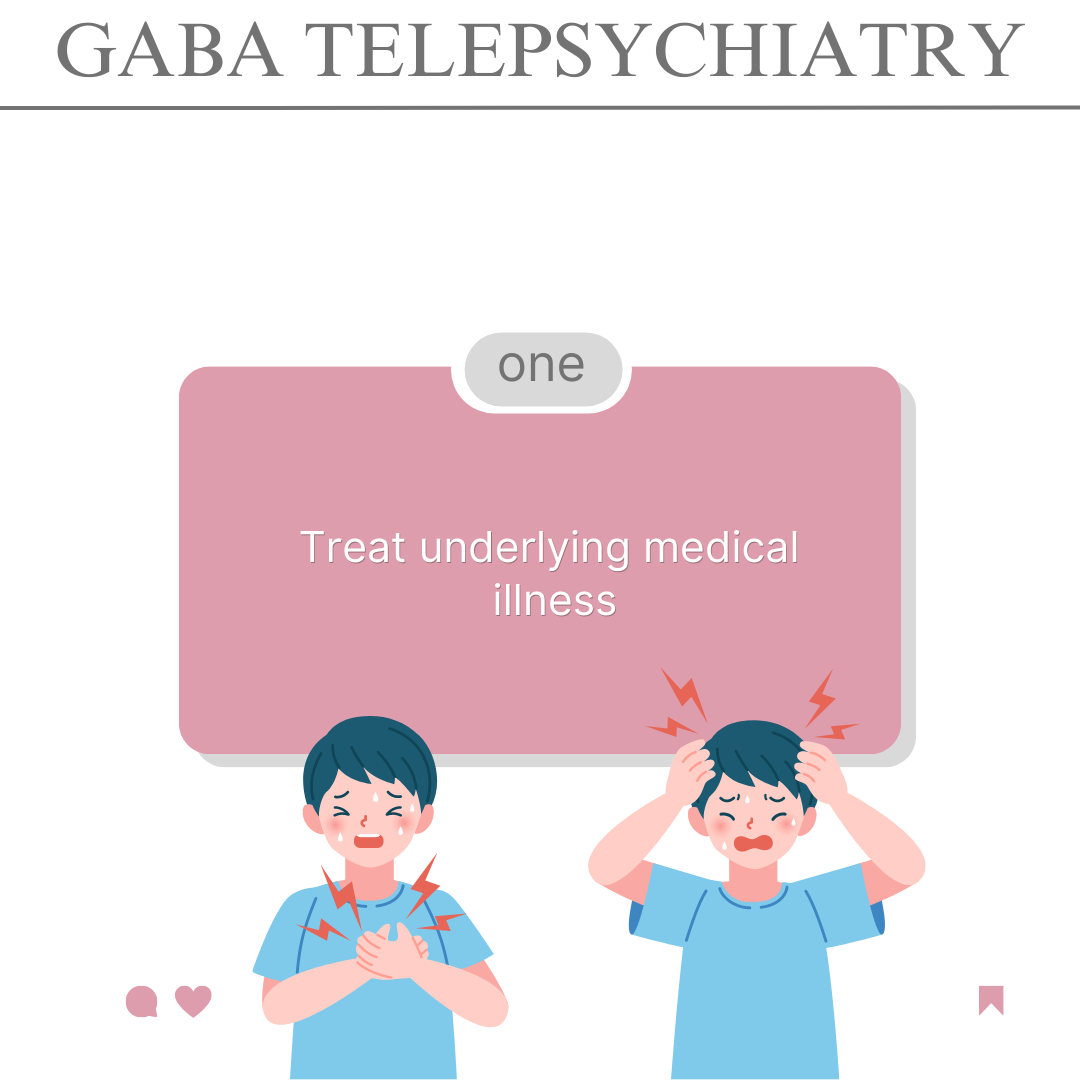
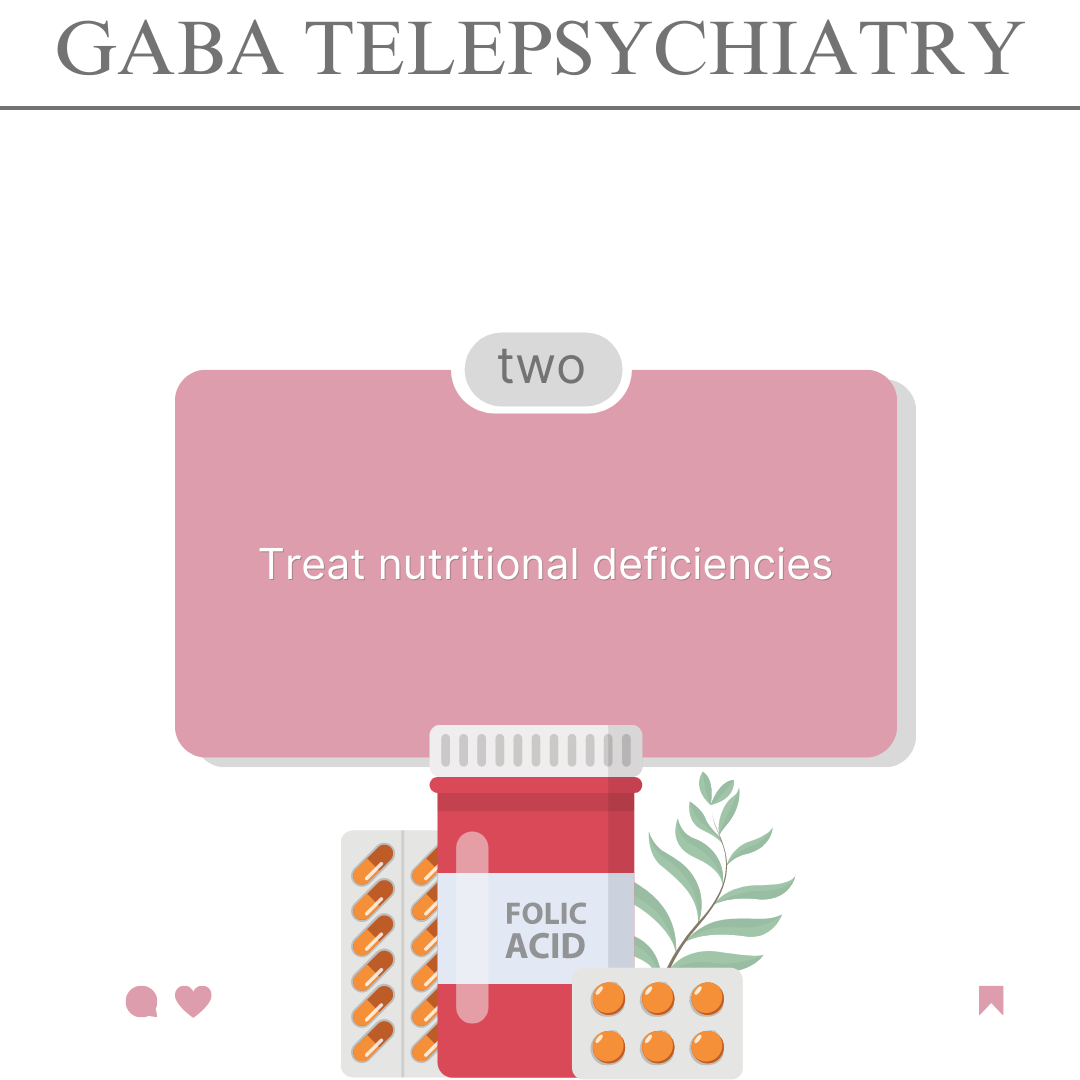
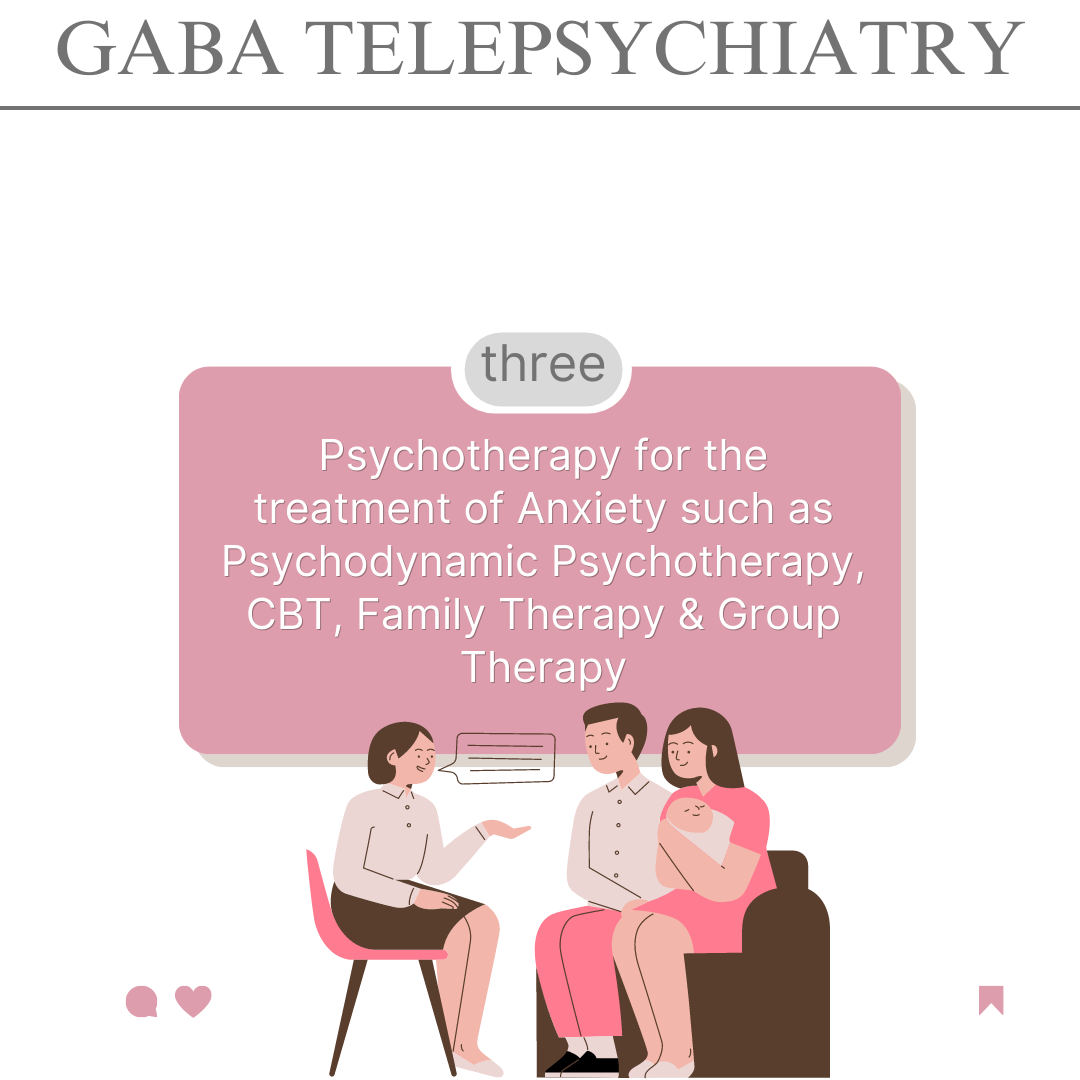
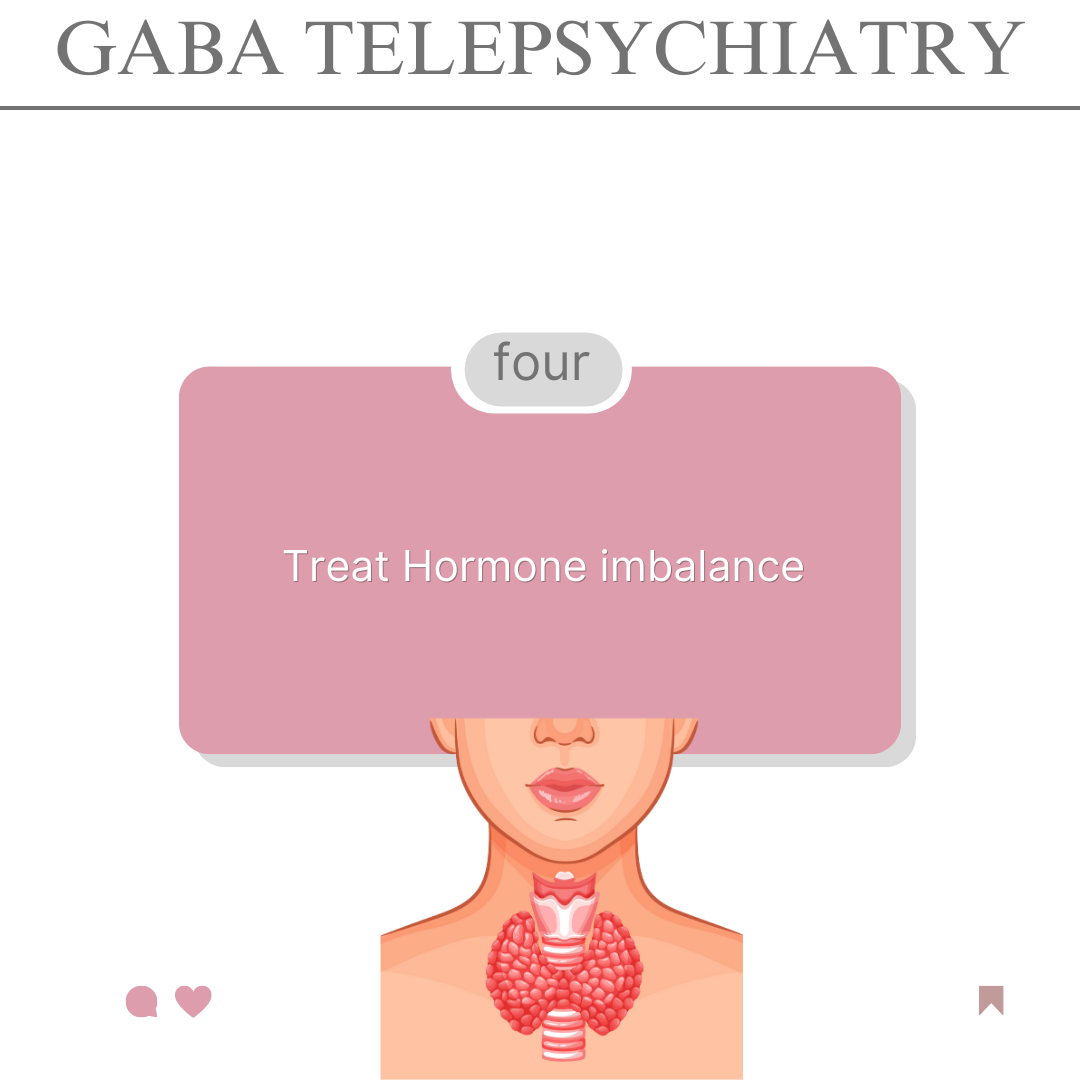
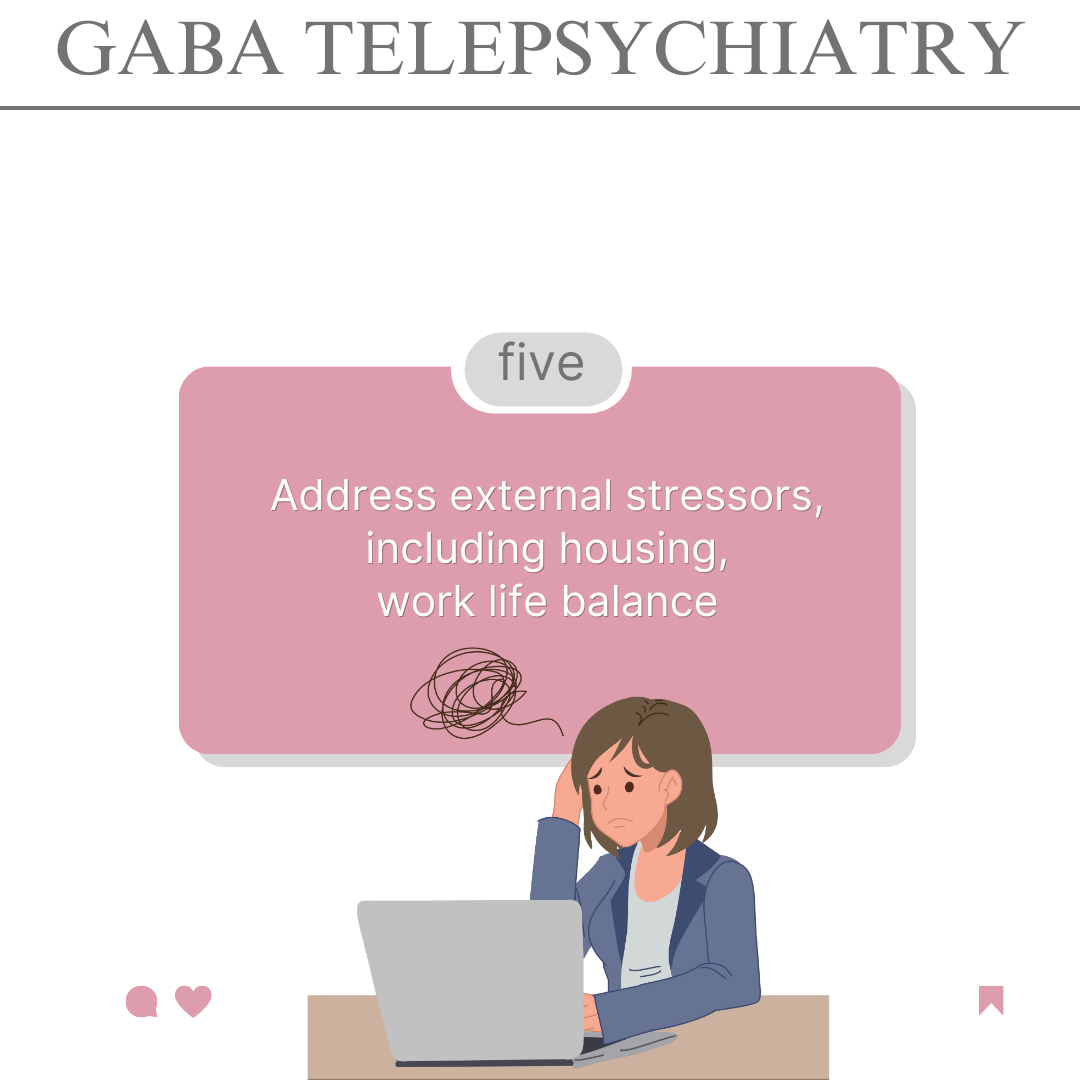
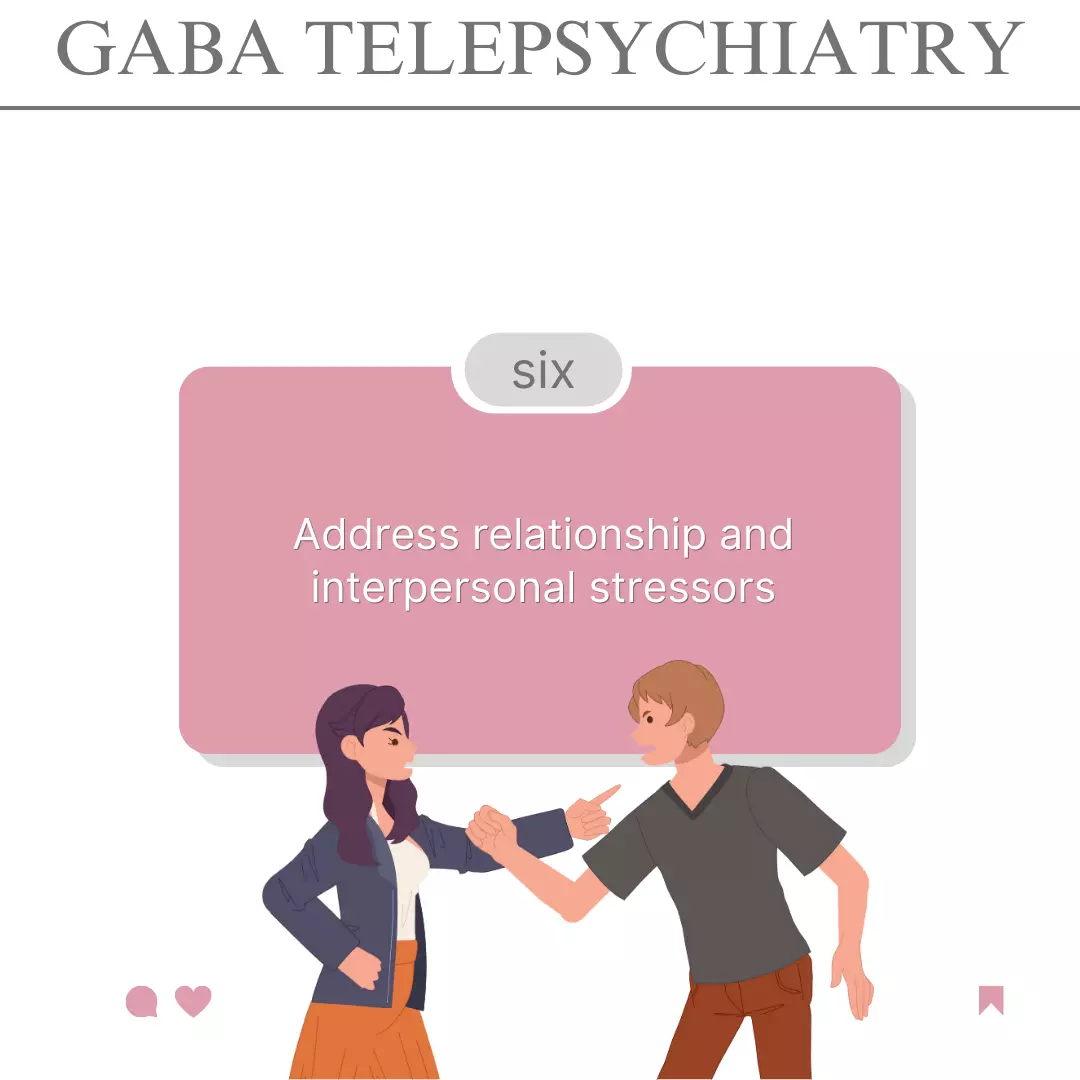
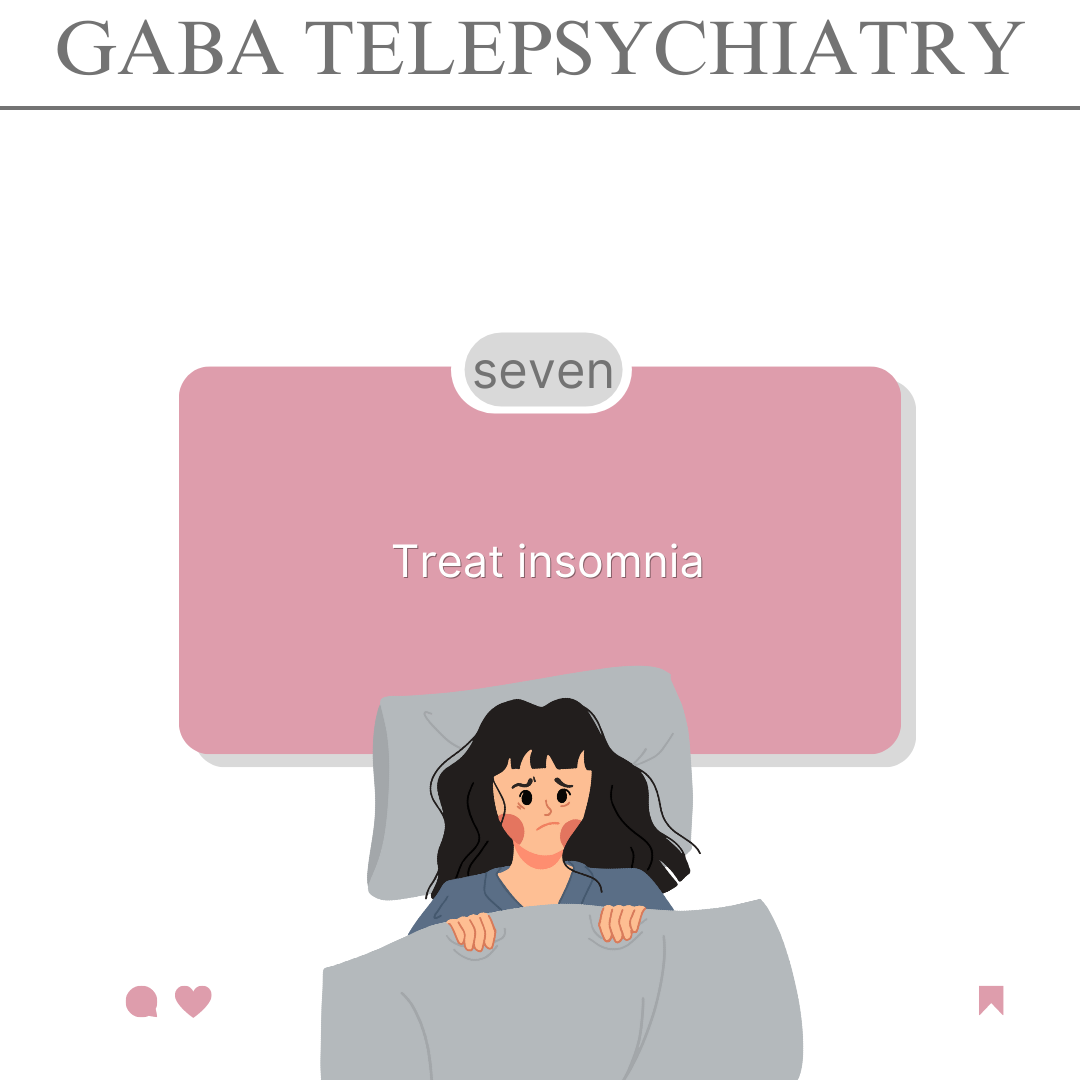
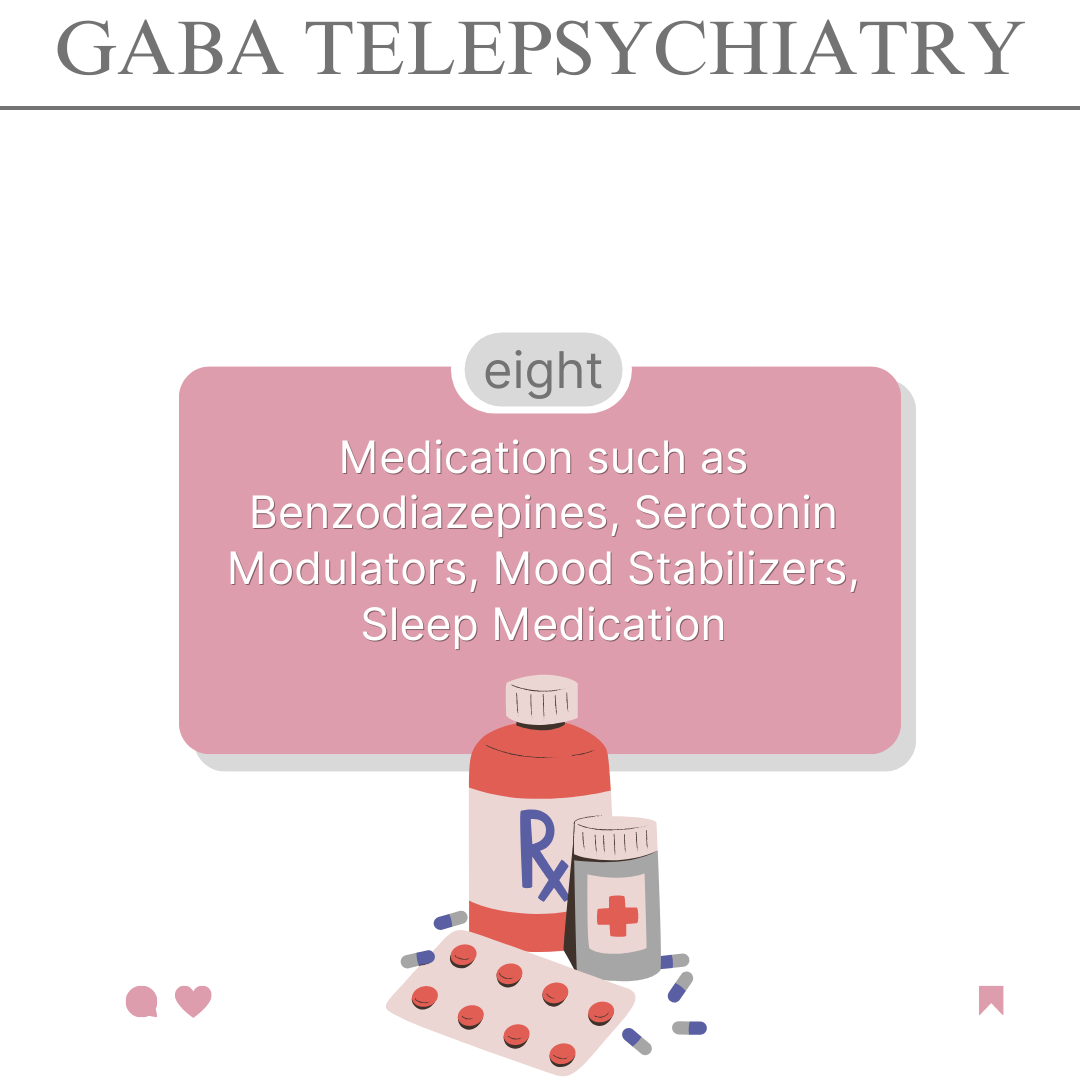
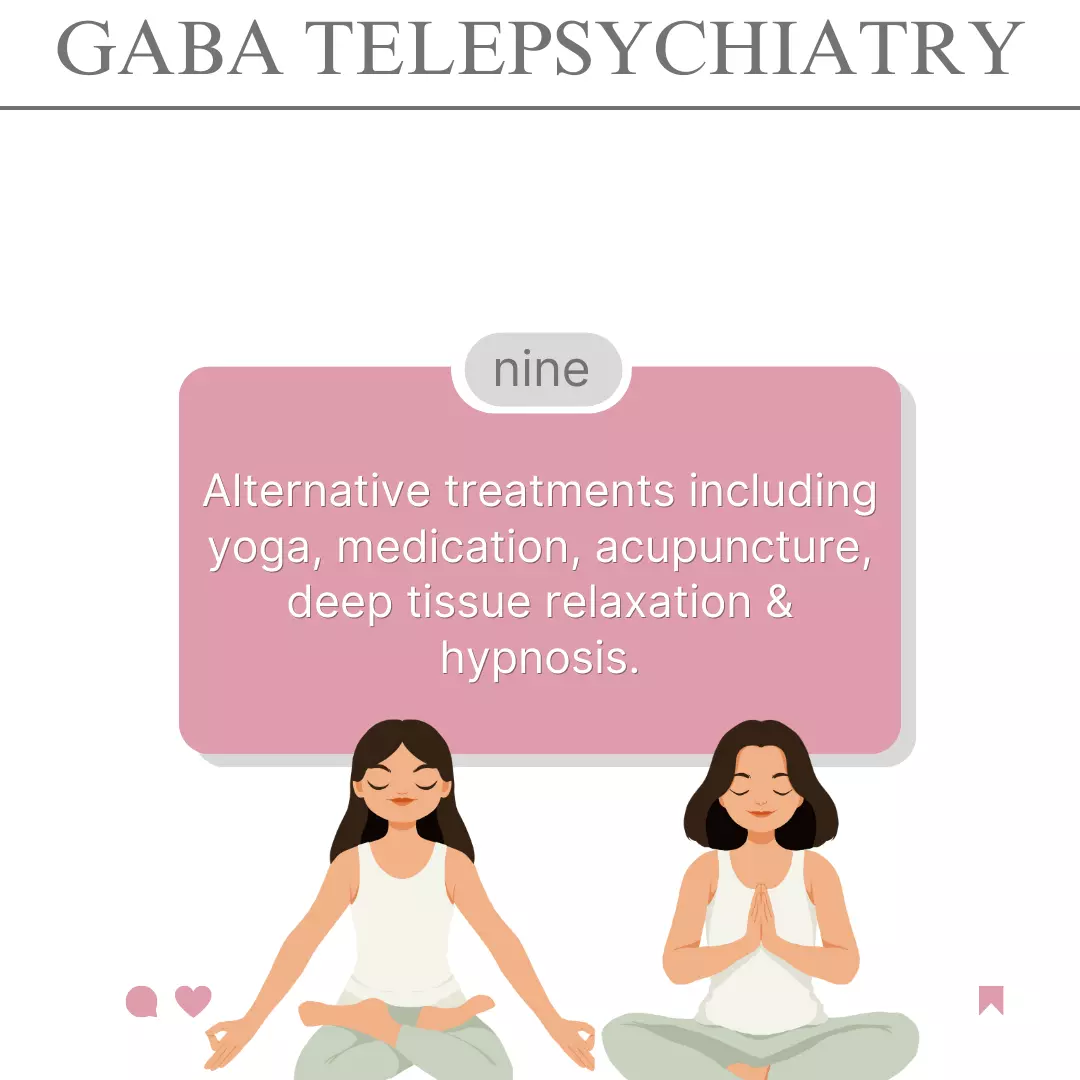
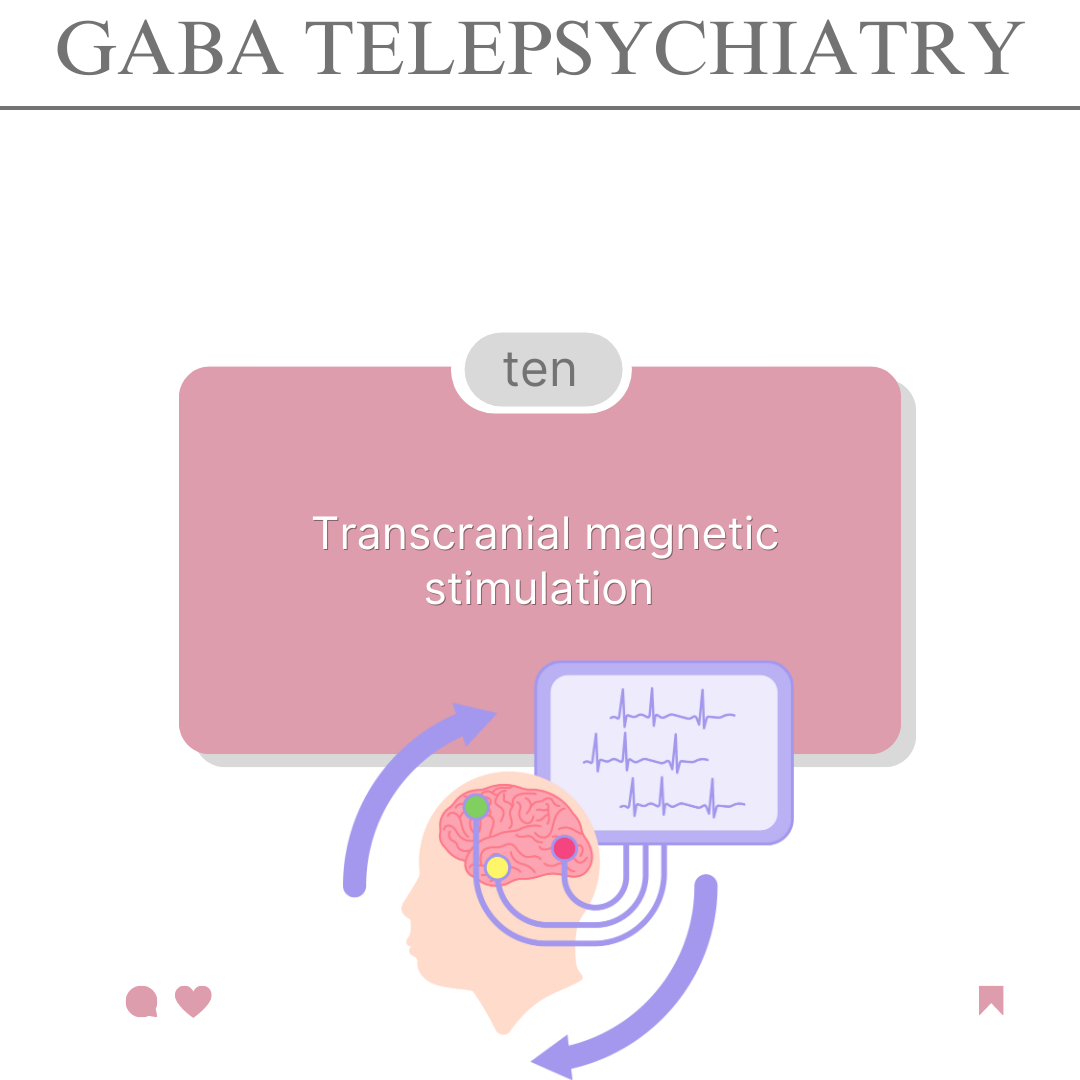
Do I need Medication for Anxiety?
Most individuals suffering from anxiety are unaware that their anxiety is treatable, believe their symptoms are ‘normal,’ or are too anxious to receive treatment.
You may need medication for anxiety if symptoms are:
- Interfering with your day to day life.
- Interfering with your relationships.
- Interfering with your academic performance.
- Interfering with your health.
- Interfering with your career or career progression.
At Gaba telepsychiatry, psychiatrists take an integrative approach and work closely with you to create a treatment plan that you feel comfortable with. Our staff is here to support you during the treatment and recovery process.
Schedule an appointment online or click the link to learn more about treatment of anxiety.
